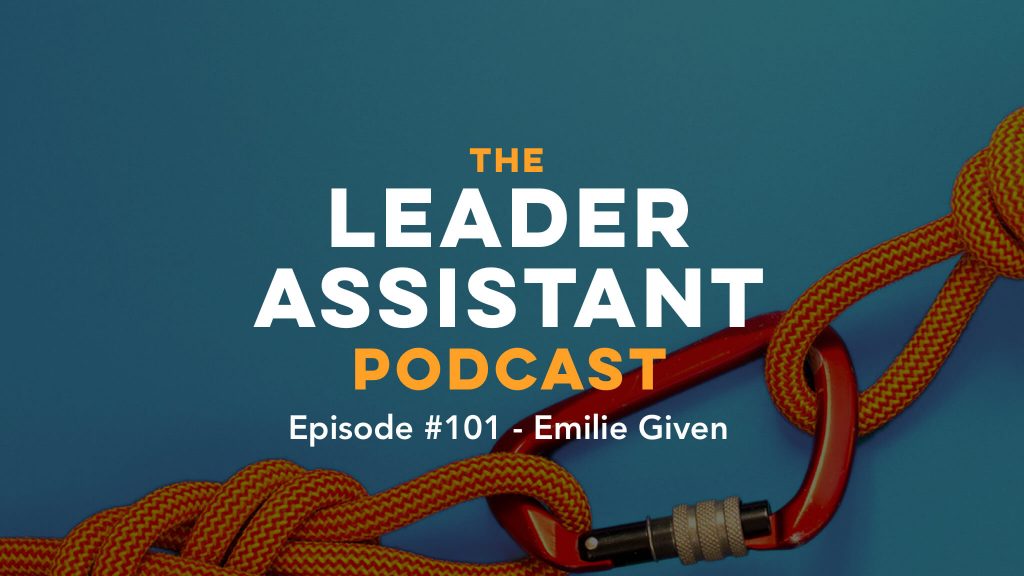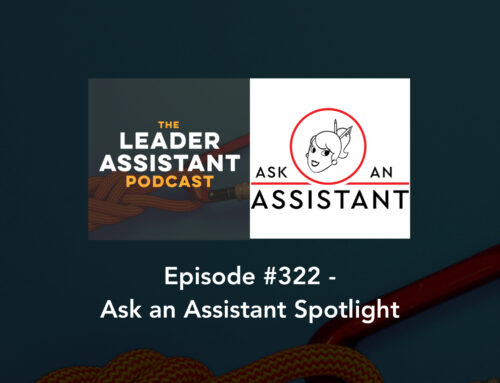Emilie Given’s focus is to inspire other women to create a career that allows them to focus on passion over paperwork and family over familiarity. She runs a virtual assistant team and has a lot of wisdom to share!
In this episode, Emilie talks about what it was like being an executive assistant at Amazon, how almost dying pushed her to make the move to becoming a virtual assistant, how to find VA clients, managing multiple executives, and more. Enjoy our conversation and be sure to connect with Emilie via the links below!
LEADERSHIP QUOTE
Empowered women empower women.
LEADER ASSISTANT LIVE EVENTS
Check out our constantly updated schedule of events for admins and assistants at LeaderAssistantLive.com!
THE LEADER ASSISTANT BOOK
Download the first 3 chapters of The Leader Assistant: Four Pillars of Game-Changing Assistant for FREE here or buy it on Amazon or Audible.
JOIN THE FREE COMMUNITY
Join the Leader Assistant Slack Community here, or the Facebook Group here for bonus content and to network with other assistants who are committed to becoming leaders!
CONNECT WITH EMILIE
- Emilie on LinkedIn
- Emilie on Instagram
- She’s A Given – Virtual Assistant Company
- She’s A Given Academy
ABOUT EMILIE
Emilie Given is a wife, boy mom, and entrepreneur. She founded She’s A Given, a Seattle-based virtual assistant company in 2018 to be able to spend more time with her family. Through her thriving business, Emilie’s primary focus is to inspire other women to create a career that allows them to focus on passion over paperwork and family over familiarity.
SUBSCRIBE
Subscribe to The Leader Assistant Podcast so you don’t miss new episodes!
You can find the show on Apple Podcasts, Spotify, Google Podcasts, Pandora, and Stitcher.
Join my email list here if you want to get an email when a new episode goes live.
LEAVE A REVIEW
If you’re enjoying the podcast, please take 2 minutes to rate and review the show on Apple Podcasts here. Each review helps me stay motivated to keep the show going!
—
EPISODE TRANSCRIPT
Emilie Given 0:00
Hi everyone, my name is Emilie Given. And today’s leadership quote is one of my favorites. Empowered Women empower women.
Podcast Intro 0:09
The Leader Assistant Podcast exists to encourage and challenge assistants to become confident game changing leader assistants.
Jeremy Burrows 0:17
Thank you so much for listening all I’m logged in, here’s your host my data. Hey, friends, welcome to episode 101. Check out the show notes at leaderassistant.com/101. And I just wanted to invite you to join our Slack community at Slack.leaderassistant.com. Hop in there, jump into the intros channel and introduce yourself. And we’ll see you in there. Hey, everyone, thanks for tuning in to The Leader Assistant Podcast. It’s your host, Jeremy Burrows. And today I’m speaking with Emilie Given. Emilie is a wife, boy mom and entrepreneur she founded she’s a given a Seattle based virtual assistant company in 2018. So that she could spend more time with her family. Emilie, how’s it going?
Emilie Given 1:07
It’s going great. How are you?
Jeremy Burrows 1:09
I’m doing well. What part of the world are you in?
Emilie Given 1:12
I live in Lynnwood. Washington was just just north of Seattle.
Jeremy Burrows 1:17
Awesome. So is it kind of chilly up there today?
Emilie Given 1:20
It is. Yes. It’s very cool. We just had 35 days of rain. So it’s really rainy. But I grew up here. So I’m used to
Jeremy Burrows 1:31
it. Yeah. Awesome. So let’s jump right in. And why don’t you tell us about your very first job. And then maybe what skills or lessons you learned in that role that you still use today?
Emilie Given 1:45
Okay, so my very first job was being a barista at a kiosk inside of a Safeway. And, you know, that’s not very correlated to what I do now. But I would say that it was my first glimpse into customer service, and building relationships with my regular customers, customers and my people.
Jeremy Burrows 2:11
Awesome. Customer service is a big part of assisting people. So definitely a good, good start. So when did you kind of transition throughout your career and become an assistant?
Emilie Given 2:29
Sorry, did you mean first career job or first job in general?
Jeremy Burrows 2:33
You could say, what yeah, what was your What was your job after that? And kind of how did you get into the EA role,
Emilie Given 2:39
I went to trade school after high school to become a medical assistant. And I was a medical assistant for six years prior to going into management at still in healthcare. So it was always in a support position. And then I was in management, but also, under physicians still supporting them word at an executive level. So I didn’t love being in healthcare and not dealing with patients. So I decided to look around. And I actually organically applied to an EA job amazon online. And they called me back. And so, right. I’ve heard it’s really hard to get an interview organically without knowing somebody. I don’t know if that’s true. But I felt really lucky to get that. And the woman who hired me actually had a background in healthcare as well. And so she saw that transference was great. She had been supporting physicians, and how you can go to support executives, and she saw that in me and helped me develop it.
Jeremy Burrows 3:47
So how long were you at Amazon?
Emilie Given 3:50
I was at Amazon for four and a half years.
Jeremy Burrows 3:53
So what was like working for one of the largest companies in the world.
Emilie Given 3:57
I loved that job. I really did. And I wouldn’t have left. If I wasn’t doing what I am now. It was amazing to be around such innovative people all the time. The company moves so fast. They’re always trying new things. I learned so much working from there about professionalism, about thinking big about being innovative, and learning. More like it’s okay to fail. And that was probably one of my favorite things I learned from Amazon was that it’s okay to fail. And that you’ll you’ll improve upon it and move forward.
Jeremy Burrows 4:41
So could you share an example of maybe something that was that was innovative?
Emilie Given 4:50
So actually, the team that I love about this is our role in general or being just Amazon.
Jeremy Burrows 4:57
Yeah, just being at Amazon. You mentioned, you know, they were so innovative with some just even a simple example of something you saw in the team or in the company just being on the inside that was innovative that you don’t have a nondisclosure agreement.
Emilie Given 5:13
Right. So the team that I last left with call decks, which is deliver experience in robotics. So what when I was there, they created the sidewalk delivery robot. It’s called Scout now. And they were actually on Ellen, Monday of this week. So scout was on Ellen, and they have delivery robots launching, while they’re here in Seattle area, and it’s pretty cool. It drives around the neighborhood and delivers packages, and it was just so amazing to be supporting the leaders behind that, which is really inspiring.
Jeremy Burrows 5:47
Wow. Yeah, that is cool. Kind of be behind the scenes, and then it’s finally out. It’s awesome.
Emilie Given 5:54
It was really cool. Um, we got to host the big launch party is in a PR team. And that was just a really great experience.
Jeremy Burrows 6:03
So did they have the robot at the launch party?
Emilie Given 6:05
They did. Yeah.
Jeremy Burrows 6:07
Nice. So what would you say to assistants you worked with literally on a team that built a robot? What would you say to assistants who are kind of trying to figure out what they think about the whole AI, robotic future, and then how it relates to the assistant role.
Emilie Given 6:31
I think that really depends on the type of people that you’re supporting, right, and the type of assistant work that you have been doing prior. For me there was it was a very tech based team. However, there were a lot of operations teams with in it that weren’t necessarily tech based. So I would say, for an assistant wanting to explore AI, robotics. I would say maybe go spend the day if you’re already internal in the company with that team and see if it’s something that you were interested in, what the EAA day to day does. And then if you’re interviewing for, for a role in a company like that, when they’re working on something like that, I think it’s really important to ask what the teams do. So summary of what this team does, what leader you’re going to be supporting. And just really have a good understanding of that before you jump into it.
Jeremy Burrows 7:31
So just like a maybe a general curiosity,
Emilie Given 7:37
yes, but I think it’s also important to really know, like, deep dive into what they do on a day to day basis, rather than know what they do as a whole. And that’s important too. But really diving into the details is important too, just because it is so intricate, there’s so many different things that they can be doing. And they’re all different roles that work together.
Jeremy Burrows 8:00
Yeah. Nice. So tell us a little bit about your story of leading Amazon and becoming a virtual assistant.
Emilie Given 8:13
So I had a child, my son ejf, three and a half years ago. And Amazon had a great maternity leave I was I had a very supportive leadership team, everyone was great. But I actually almost died in childbirth. And it was such a life shattering experience for me that I couldn’t stop focusing on the fact that time with my family was really precious. And I really wanted to figure out a way where I could work from home more. And my team was, this was a team prior to Dex robotics, they were so it’s important. I was working from home three days a week. And then, you know, we got so busy in the new team, that it that wasn’t really working out. So I could work from home. Sometimes it wasn’t enough. For me personally, I was driving an hour, sometimes hour and a half each way in traffic work. And so I would leave in the morning before he was awake, my son and get home and only have about an hour and a half with them. And that just wasn’t enough for me. So I decided to figure out a way where I could still make money because we have, we have to be a two income family personally. And I could still make money. And I could work from home and spend more time with him. And so I knew of the virtual assistant role and so I decided to try it out as a side hustle and see what it was all about. And so that I picked up a client for about 10 hours a week that I would do evening was on weekends work on and then kind of proved to myself that I could get clients and make this a full time position. So I pitched it to my husband and he said, You know what, go for it. And I finally did.
Jeremy Burrows 10:20
Awesome. So how long did it take you to get kind of up to where you wanted to be with as far as the number of clients when he when he left Amazon?
Emilie Given 10:32
How long did it take? So I started as a freelance VA on the side, probably six months prior to putting in my notice, No, that’s wrong a year prior to putting in my notice, I signed a 10 hour week client, and then I kept increasing. So at one point, right before I left, probably about two months before I left, I was at 40 hours a week as a virtual assistant and 40 hours a week at Amazon. So I was working 80 hour weeks, which was insane. And finally, what made me realize, hey, Emily, you can actually do this full time you are doing it full time. And it’s you should just take a leap of faith and trust yourself that it’s going to work, this is going to be great. So I did and I’m really glad that I did. It’s been the best experience I’ve ever I’ve ever had.
Jeremy Burrows 11:28
So do you have any tips for other virtual assistants that one of you know, find more clients.
Emilie Given 11:36
So my first clients, actually, I found them on Upwork, which is set for freelancers. And so I just created a profile to get my name out there. There are 1000s of people looking for assistance on Upwork. And that’s how I got my first couple of clients. And then once you get testimonials underneath your belt, what I did was I built a website, put their testimonials on there. And there are a lot of ways to get clients, you can use LinkedIn, you can use, which is something that I do frequently. I also engage in a lot of Facebook groups targeted to my niche, which is well, I have two, I guess two niches, one is female, female and companies in the Seattle area. That’s really specific. I know. And the other one is startup companies in the Seattle area, and small businesses in Seattle. So I’m pretty Seattle centric. I really believe in supporting the local economy. And I think that there’s value to be added in having a system that is one virtual that I provide those benefits, but also that I could bump into at the grocery store or meet for coffee if I wanted to or needed to.
Jeremy Burrows 12:54
Yeah, like that.
Emilie Given 12:56
So sorry, I kind of went off on a tangent Facebook groups. Facebook groups are really great. The number one tip, I would give VAs in Facebook groups, because there are a ton of ton of vas. I mean, I would say that add value before anything else. So somebody ask a question, answer it, without the expectation of them becoming a client, just be very helpful in the online space. And then you’ll come to be top of mind when they think of who am I going to hire as a virtual assistant?
Jeremy Burrows 13:27
So do you specialize? Or do you even do you think in general, should virtual assistants specialize? Or should they be more of a jack or Jane of all trades? In other words, should virtual assistants focus on I’m going to be a graphic designer, virtual assistant or I’m going to be a scheduling and travel itinerary virtual assistant. Does that make sense?
Emilie Given 13:53
Yeah, this is a great question because I at first would say start as Jack of all trades, Juniper portraits. But I’m realizing now that I personally want to niche down in, in my agency model. So I would love to provide executive support, which is, you know, calendar travel expenses. I’m great at that. That’s what I did Amazon. That’s what I love. That’s what EAS E is in general can pick that up and start quickly. So that’s maybe something I would tell an EA who wants to become a VA is to stick with or start with executive support because that’s what they know and the need is out there.
Jeremy Burrows 14:39
Yeah, that makes sense.
Emilie Given 14:42
But if a virtual assistant wants to specialize down the road, I think that’s that’s completely fine. There are bas who just aren’t graphic designers. There are VAs who are just branding specialists. There are bas who just do outreach for speakers and podcasting, things like that. And I think that There’s no right or wrong answer for this. Just know, whatever you do, whether you’re niching down, or whether you’re being broad know where your target market is, and go there.
Jeremy Burrows 15:14
So, what about tips for managing multiple executives? You know, I, I kind of tried out the whole VA thing when I was in between jobs and had one client for about a month. And I was like, Yeah, I don’t know if I want to have six bosses. So how do you? How do you manage multiple clients and multiple executives.
Emilie Given 15:36
It’s, it’s definitely a learning curve. And, you know, when you’re VA, you’re not have you don’t have six bosses for 40 hours a week, each, you generally would have six bosses for two hours a day, or, you know what I mean, five hours a week. So I would really, this is my number one tip is to time block. So you color code your calendar you work on, if you’re set up for two hours a day on one client, you color code it two hours a day, time, block it for on your calendar, and then the next two hours would be a different client. And the next one would be another client. Because if you try to do a bunch of 15 minute tasks here, and 15 minute texts, there, you’re just not as productive as you would be if you just sat down and did it all in a big chunk. So that’s, that’s what I would say for well, tooling, managing multiple clients, as well as having labels set up in your inbox. So you can flag them different different clients. Also, something that we personally do is we set up email accounts for each of our clients. So admin at XYZ company.com. And it goes on our phones so we have, know where it’s coming from and who are responding from.
Jeremy Burrows 16:55
So, how many assistants work with you now?
Emilie Given 16:59
We are a group of 10 right now.
Jeremy Burrows 17:02
Awesome. So when did you realize I need to, I need to hire more on my team versus just doing it? You know, solo,
Emilie Given 17:09
it was pretty quickly after I left Amazon, I figured I could only work 160 hours a month, right? 40 hours a week. And I wasn’t comfortable with that income cap. Honestly, I wanted to scale. And I wanted to make a bigger impact. And I wanted to make more money. And I knew that the way to do that was to hire a team. So I did that really quickly.
Jeremy Burrows 17:34
So any tips for that process as as people branch out and want to start their own VA team?
Emilie Given 17:41
Match? We’re going to be creating a course on this this year. Yes. So a couple of tips that I have would be to hire the right people for the right job. So if you’re going to be niched down as a graphic design agency, then make sure you have people with graphic design experience and you’re not hiring, hiring those Jane of all trades, I would say get specialized with it. I would also say that you shouldn’t have systems set up before you hire people. So if you know how you work with a client, you know how you schedule meetings, how you want them to be labeled how you set up an inbox, to be managed, how any process that you have in your head, because you as your person as one person might have it in your head. But if you get hit by a bus, or if you are training someone how to do it, it’s much easier to do it if you already have a written SOP out.
Jeremy Burrows 18:33
So where did you find your team?
Emilie Given 18:36
I found my team in a variety of ways I found my team, some of my team comes from Upwork actually, I met them on Upwork. Some of my team comes from Facebook groups for executive assistants. Some of my team comes from people that I’ve worked with previously and previous roles kind of comes from everywhere. But I do have an interview process, resume review, a skills assessment, an initial phone screen with my HR person, Amber and then a phone screen with me to make sure it’s solid and fit.
Jeremy Burrows 19:07
So what are some questions that you ask in the interview process?
Emilie Given 19:13
How you deal with difficult clients. Give me an example of how you deal with a difficult client. And give me an example of how you prioritize what you need to do. Give me an example of a time someone was really big. But you know, you couldn’t go back and forth asking a bunch of questions about it. What would you do if I gave you I generally come up with scenarios what would you do if I said schedule me a flight to Boston on Tuesday next week. And so I want to know what the process is would you find out my home airport How would you screenshot the results and send it to me? Would with pricing Would you would you out asked me questions before you did that. And that’s what I want to know, do you have the foresight to figure it out by yourself first and then fill in the gaps? That’s, I think that’s the most important thing when I’m when I’m working with somebody, I want to know that they don’t ask questions that they can solve for themselves. Or
Jeremy Burrows 20:16
their or their challenges. I’m sure there are I know, there are I’ve tried it myself, but what are the challenges for kind of running your own business?
Emilie Given 20:26
Oh, man. That’s a loaded question. I think, honestly, the challenges of running your own business is time management, for sure. I mean, that’s the number one challenge time management, you can be great at time management, but they’re always fire drills. And, you know, you have to swap parties really quickly and answer things that are emergent. And then you have a lead comes in who wants to jump on a phone call? 30 minutes, and you have to rearrange your day to figure that out. And there’s, there’s a lot to do. So. My team has been amazing. So outsourcing to my team has been really beneficial to me. But John is running out of business. Yeah, that’s, that’s a loaded question there.
Jeremy Burrows 21:17
Yeah. So what about managing constant interruptions, maybe just an example of how you manage all the interruptions that I’m sure you get day in and day out.
Emilie Given 21:28
I think one of the biggest tips I can say about managing constant interruptions is when I’m really focusing on something, make sure my phone is upside down. So I’m not looking at the screen. And I would say having my inbox closed, which is really hard. It’s like a control thing for me to not see an email when it comes in or respond by rate. Because just find me neurotic, I check my phone every five seconds. And I’m one of those people that refreshes. Like, with a thumb drag every, if I’m doing it, I’ll do it five times to make sure that everything’s loaded. And I think a lot of us EAS are like that, right? So I would say, really make sure you’re setting yourself up to not be interrupted. If you’re deep in a project, like pull your turn your phone over, close your email, and work on your project for even if it’s just a 3030 minute increment, do it without distractions, then check, then work for anything over 30 more minutes. I would say that’s my best tip. Yeah.
Jeremy Burrows 22:25
How about managing an executives inbox, any tips for that?
Emilie Given 22:35
Definitely create labels. I would say create filters as well, I have a felt, except for something I learned with filters is I set one up for newsletters, but I set it up for the word newsletter. And we actually help clients with newsletters. So I was finding that I wasn’t getting client mails, and they would respond to me. Why didn’t you respond to the email, and I found out that they weren’t getting filtered into that. So protip don’t do that. Like Oh, no. And then another one would be, there’s a free chrome extension called gorgeous, it’s G O RG IAS. And it creates amazing beautiful email templates that they just come in to drop down in your book in your inbox. So if you are in your email typing, you can just hit the button and it pulls in all of your templates. I know Gmail has templates, too, but it’s just so user friendly and easy. And that’s maybe one of my favorite things. Also managing executives inbox, find out what they sound like before you start supporting them. So find out their tone and their emails, find out what kind of verbiage they use, and try to try to emulate them and realize that you are an extension of them. And sometimes you’re going to be acting as them and not yourself. So portray them.
Jeremy Burrows 24:05
Yeah, that’s great. Love it. So if you could snap your fingers and instantly give all assistants more of something, what would it be?
Emilie Given 24:15
Respect? Nice.
Jeremy Burrows 24:19
Theory, or ESP, C T.
Emilie Given 24:21
R e. S E C T, I really think that the EA role in general is not as respected as it shouldn’t be, as some executives are great, I’m really appreciative and understand what it’s like to be an EA. But some people treat them like peons. And it’s it’s not right. I mean, a good executive assistant is behind the success of every successful executive. So I think that respect is really necessary and it’s a mutual respect. Obviously, you’re going to respect your executive and they’re going to express appeal. But I just think that yeas work really hard. And they should be acknowledged.
Jeremy Burrows 25:09
Yeah, I agree. So what makes an assistant, a leader?
Emilie Given 25:19
I think what makes an assistant, a leader is somebody who is constantly learning and sharing the information. Someone who is really passionate about just like I said, learning learning new tools, whether that’s productivity tools that’ll be helpful in the office, whether that’s sharing a seminar or a meet up that they’re going to. That’s a learning experience for EAS. I think that’s really disseminating information that you have yourself and to make other people’s people better, that makes you a leader.
Jeremy Burrows 25:57
Nice. So I don’t think I sent you this question, but I’m just curious, how many times have you told a client or a potential client that’s tried to hire you know?
Emilie Given 26:11
Twice? Wow. out it doesn’t count when they don’t meet budget requirements? Because there’s been a lot more than that before.
Jeremy Burrows 26:20
Yeah, yeah, I think more just like there’s, they have the money to pay you, but it’s just not a fit.
Emilie Given 26:27
Right? And so you just have to say that you just say, one. I mean, I’m really honest, if I don’t have the skills that they need, I, I am not going to lie about it. I have enough clients right now that I am not going to lie and say that I can do something when I can’t. So if one I’ll straight up, say, and I’m really sorry, I don’t think we’re a great fit due to my skill set. Or we don’t have anybody on the team that can fill that need for you. Or two, I’m not sure that I haven’t actually said that. personalities don’t mesh before. But I I’ve definitely had that conversation in my head that if this were to go forward, I would say, you know, I don’t know if we’re the right fit for each other. Because I think that’s something that’s so important when you’re working with an executive, whether you’re in person, whether you’re online, you need to mesh, you need to be able to talk to each other, they need to be approachable. You need to feel like, you can talk to them, you need to feel like you what am I trying to say? You need to feel comfortable? And that you you vibe with them, essentially that you’re together. And if you don’t feel that, I don’t believe it’s something that you should or should pursue. Yeah.
Jeremy Burrows 27:47
Yeah, it’s got to be chemistry.
Emilie Given 27:49
Exactly. Chemistry is very important in that. Yeah. Yeah. executive role.
Jeremy Burrows 27:54
So what, what’s something you would recommend, if you’re talking to an EA listening right now, who’s debating becoming a virtual assistant, whether it’s starting their own VA firm or just simply transitioning from an office, EA to a remote VA, what’s kind of the number one thing you would recommend they do? As they consider if that’s their next career move?
Emilie Given 28:21
I would say try it out before you make the leap. Don’t quit your job and think that you’re going to be successful right away. Because finding clients is the hardest thing. And many people do it and don’t find clients for months and months and months. So I would say, if you can pick it up as a side hustle first to see if you like it.
Jeremy Burrows 28:39
Awesome, Emily, well, where can we find you online? And yeah, how can people get a hold of you? And how can we support what you’re doing?
Speaker 1 28:48
So my website is www.shesagiven.com. You can find me on Instagram instagram.com. Plus, she’s a given Facebook is also at she’s a given. So I’m consistent in all my handles there. And if you are interested in what learning how to become a VA, if you’re interested in coaching or starting your own business, if you’re interested in working with a virtual assistant, or just have questions about it, please feel free to reach out and ask. I’m here to help you explore this possibility. And I’m also going to be launching a couple of courses and coaching soon. So if anybody’s interested in that, please reach out.
Jeremy Burrows 29:27
Awesome. Well, I’ll share your links in the show notes, even though they’re nice and consistent and easy to remember. She’s a given. That’s good, good branding, in my opinion. But yeah, we’ll make it easy for people to find you and yeah, thanks for taking time out of your day. Best of luck to you and your business and your son and your your Seattle Reign. And yeah, thanks for thanks again for being on the show.
Emilie Given 29:53
Thanks so much for having me. Jeremy. It was great speaking with you
Unknown Speaker 30:05
Please live you on Apple podcasts goburrows.com







